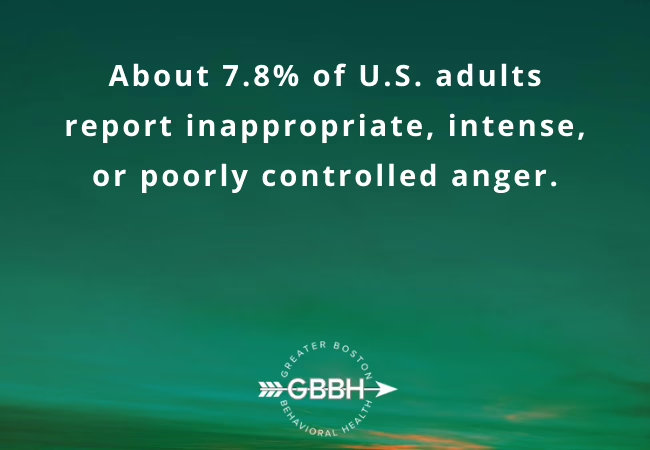Anger, in itself, isn’t a problem—it’s a natural emotional response signaling that something important needs attention. However, chronic, explosive, or suppressed anger can erode relationships, damage careers, harm mental and physical health, and leave you feeling trapped by your own reactions.
The good news? Anger is manageable. With the right therapy techniques, you can break free from destructive anger cycles and learn how to respond to frustration and conflict with clarity and control.
At Greater Boston Behavioral Health, we specialize in Anger Management Therapy in Boston, helping individuals of all ages build real emotional regulation skills. Whether through Mental Health Programs in Boston, Intensive Outpatient Programs (IOP), Partial Hospitalization Programs (PHP), or Residential Treatment Programs, we provide structured, evidence-based strategies that actually work.
Let’s dive deep into the top anger management therapy techniques that drive real change—and how they’re integrated into comprehensive mental health care.
1. Cognitive Restructuring (CBT Reframing Techniques)
Cognitive Behavioral Therapy Boston (CBT) is at the core of modern anger management. It helps clients identify and challenge distorted thought patterns that fuel emotional overreactions.
What It Involves:
- Tracking automatic negative thoughts triggered by events
- Evaluating the evidence for and against these thoughts
- Developing more realistic, less catastrophic interpretations
Example:
- Distorted thought: “They’re disrespecting me on purpose!”
- Cognitive restructuring: “Maybe they’re distracted, not intentionally disrespectful.”
By consistently reframing your interpretations, you decrease anger intensity and improve conflict resolution skills.
At Greater Boston Behavioral Health: CBT thought-reframing is a foundation in individual therapy and anger management group sessions across all levels of care—outpatient, IOP, PHP, and residential.
2. Mindfulness-Based Anger Awareness
Mindfulness teaches individuals to observe their anger rather than being overwhelmed by it.
Key Mindfulness Skills:
- Body awareness: Recognizing physical signs of anger escalation (tight muscles, flushed face)
- Emotion labeling: Naming feelings (“I feel disrespected”) instead of acting them out
- Present moment focus: Reducing rumination about past insults or future fears
Mindfulness creates a pause between trigger and reaction—allowing logical thinking to re-enter before anger takes over.
Practical Exercise:
- STOP technique:
- S: Stop what you’re doing
- T: Take a breath
- O: Observe your body and emotions
- P: Proceed mindfully
At Greater Boston Behavioral Health: Mindfulness is integrated into daily therapy practices within Mental Therapy Programs in Boston, particularly in PHP and Residential settings, where clients practice mindfulness exercises between sessions.
3. DBT Distress Tolerance Techniques
Dialectical Behavior Therapy in Boston (DBT) offers powerful skills to tolerate distress without acting impulsively.
Critical DBT Anger Management Skills:
- TIPP Strategy: Use cold temperatures, intense aerobic activity, paced breathing, and paired muscle relaxation to quickly lower emotional arousal.
- Wise Mind Exercises: Accessing the balance between logic and emotion.
- Self-soothing Techniques: Engaging senses (e.g., calming music, scented candles) to ground yourself during anger peaks.
Example:
Feeling furious after a conflict? Instead of sending a regrettable text, take a 20-minute brisk walk and reframe your emotions before responding.
At Greater Boston Behavioral Health: Clients in IOP and PHP learn and practice DBT distress tolerance daily, using structured worksheets, skills groups, and coaching support.
4. Assertive Communication Training
Many anger episodes stem from poor communication patterns—bottled-up resentment, passive-aggressive behaviors, or explosive outbursts.
Key Communication Techniques Taught:
- Using “I” Statements: “I feel frustrated when plans change without notice” instead of “You’re so unreliable!”
- Clear Boundary Setting: Saying no respectfully but firmly.
- Active Listening: Hearing the other person’s perspective fully before responding.
By learning to communicate needs and emotions clearly, clients reduce misunderstanding and escalation dramatically.
At Greater Boston Behavioral Health: Assertive communication skills are role-played in group therapy settings, particularly in anger management-focused groups within Intensive Outpatient and Partial Hospitalization Programs.
5. Trigger Identification and Personal Anger Mapping
Many people feel anger “comes out of nowhere,” but deep therapeutic work often reveals predictable emotional triggers.
Steps in Anger Mapping:
- Identifying emotional triggers: (e.g., feeling disrespected, ignored, controlled)
- Identifying environmental triggers: (e.g., traffic, work criticism, family tension)
- Mapping physiological signs: (e.g., racing heart, tightening fists)
Personal Anger Maps are a tool that help clients visualize patterns and build early intervention strategies.
Example:
Recognizing that conflict at work predictably triggers your anger allows you to use breathing exercises and assertive scripts before the escalation point.
At Greater Boston Behavioral Health: Each client builds a personalized anger trigger profile as part of their treatment plan—in both outpatient and more intensive programs like PHP.
6. Timeout and Cooling-Off Plans
Planned withdrawal during escalating conflict is one of the simplest but most effective anger management tools.
How Timeout Plans Work:
- Recognize early escalation (physical and emotional cues)
- Verbally declare the need for a break
- Step away safely without storming out or slamming doors
- Use a pre-planned activity (walk, breathing, music) to cool down
- Return to the conversation once calm
Timeouts prevent saying or doing things you regret while allowing emotional processing.
At Greater Boston Behavioral Health: Clients practice time-out plans through real-time coaching during therapy sessions and even family therapy where needed.
7. Long-Term Anger Relapse Prevention Plans
Managing anger isn’t about quick fixes—it’s about sustainable emotional wellness.
Clients create detailed relapse prevention strategies including:
- Identifying high-risk situations
- Building supportive accountability networks
- Practicing ongoing skills (CBT, DBT, mindfulness)
- Scheduling booster therapy sessions as needed
- Recognizing when to step back into structured support (e.g., re-enrolling in IOP if needed)
Long-term plans empower clients to stay resilient and self-aware even during future challenges.
Why Greater Boston Behavioral Health?
At Greater Boston Behavioral Health, we take anger management beyond basic “calm down” advice. We offer real, structured emotional transformation through:
- Highly individualized anger management programs
- Expertise in CBT, DBT, trauma recovery, and psychiatric care
- Flexible care levels—from outpatient therapy to PHP, IOP, residential, and inpatient stabilization
- A compassionate, judgment-free atmosphere for growth
- Trauma-informed, culturally sensitive, inclusive care
Our goal is simple: to help you regain control, strengthen relationships, and live a healthier, more empowered life.
Conclusion
You are not your anger. With the right tools, training, and support, you can transform reactive anger into calm, clear, confident responses—no matter what life throws your way.
At Greater Boston Behavioral Health, we’re ready to guide you toward emotional freedom, deeper self-understanding, and lasting change. Call (888) 278-0716 today to learn more about our anger management therapy options and start your path to empowerment.
FAQ on Anger Management Techniques
What is the goal of anger management therapy?
The goal is to help individuals recognize anger triggers, develop healthy coping strategies, improve emotional regulation, and express emotions constructively.
How does Cognitive Behavioral Therapy (CBT) help with anger?
CBT teaches individuals to challenge irrational, anger-fueled thoughts and replace them with realistic, balanced perspectives—reducing emotional reactivity.
Can mindfulness really help with anger issues?
Yes. Mindfulness increases self-awareness, allowing individuals to recognize early signs of anger escalation and use calming techniques before reacting impulsively.
How long does anger management therapy usually take?
It varies. Some individuals benefit from several weeks of outpatient therapy, while others engage in longer-term work through IOP, PHP, or residential programs, especially when anger is tied to trauma or co-occurring disorders.
Is anger management part of Greater Boston Behavioral Health’s programs?
Absolutely. We integrate anger management therapy into all levels of care—from outpatient therapy to IOP, PHP, and residential treatment.


